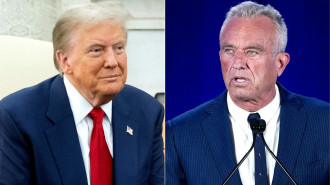Follow us on Facebook, Twitter and Instagram to stay connected
Human Rights Watch accuses Australia of 'blocking' international justice for Palestinians
Comments expressed by Australia’s foreign minister, regarding the historic ruling by the International Criminal Court (ICC) approving the investigation of war crimes and crimes against humanity in the Palestinian territories were condemned by Human Rights Watch on Thursday.
Australian Foreign Minister Marise Payne said that the ICC had no jurisdiction to investigate the matter and that her country did not recognise any Palestinian state.
“It was alarming to hear Australia’s Foreign Minister Marise Payne slam the ICC’s decision, saying that Australia ‘does not recognise a State of Palestine,’ has ‘deep concerns’ with the ruling, and that the ICC ‘should not exercise jurisdiction in this matter,’” a report by Human Rights Watch researcher Sophie McNeill said in response.
The rights group argued that these comments will have serious repercussions because while other states have signaled their disagreement with the ICC ruling, no country has argued that the ICC should not exercise jurisdiction in the case.
Australia was one of the seven countries that intervened in the proceedings to argue against the involvement of the court in the matter.
“Australia regularly supports and defends Israel’s actions on the international stage,” McNeill wrote.
“But an ICC probe is not about taking sides in a political conflict. It’s about ensuring that perpetrators of serious international crimes, both Israeli and Palestinian, answer for their actions at a fair trial.”
Twitter Post
|
McNeill's report also drew attention to Australia’s track record of speaking out against human rights abuses across Asia, specifically China’s oppression of Uighur Muslims in Xinjiang, suppression of protesters in Hong Kong, and the recent military coup in Myanmar.
“If Australia wants to be a credible voice on human rights, it should speak out wherever abuses occur and respect the ICC’s decisions. It should be consistent in its support for justice, accountability, and the rule of law regardless of the context,” the report said.
“Instead of undermining the ICC, Australia should voice its support for the court, protect its independence, and stop trying to block a Palestine investigation.”
The court’s ruling offers hope to those who have been waiting for the ICC to exercise its jurisdiction in the West Bank, east Jerusalem and the Gaza Strip, which are claimed by Palestinians for a future state but have been occupied by Israel since 1967.
“After half a century of impunity since the Israeli occupation began, the ICC decision finally offers some real hope for justice, as crimes in the West Bank and Gaza Strip may now to be subject to a formal probe,” the report said.
Israel is concerned any possible investigation could lead to international arrest warrants against Israeli officials and military officers, while boosting Boycott, Divestment and Sanctions (BDS) campaigns against Israel.
BDS is a movement aiming to end international support for Israel and pressure it to comply with international law.
While the Palestinians have been prevented by Israel from establishing a state with full sovereignty and control of its territory, the State of Palestine, declared in exile in 1988, is a non-member observer state at the UN General Assembly.
That title, granted in 2012, allowed the State of Palestine to join the ICC and ask the court to investigate Israeli military actions in Gaza and settlement activities in the West Bank and east Jerusalem from 2014.
Palestinian factions have welcomed the ICC's decision, including Hamas, which said it would be willing to fully cooperate with the court.







 Follow the Middle East's top stories in English at The New Arab on Google News
Follow the Middle East's top stories in English at The New Arab on Google News

![The meeting between Musk and Iravani was 'positive', Iranian sources said [Getty]](/sites/default/files/styles/image_330x185/public/2024-11/GettyImages-2184077711.jpg?h=f5c1ac2a&itok=Wb2mIhsF)
![Dutch politicians have used harsh rhetoric against the country's Muslims following Israeli-instigated violence [Getty]](/sites/default/files/styles/image_330x185/public/2024-11/GettyImages-2184046796.jpg?h=199d8c1f&itok=3kSTEWRC)